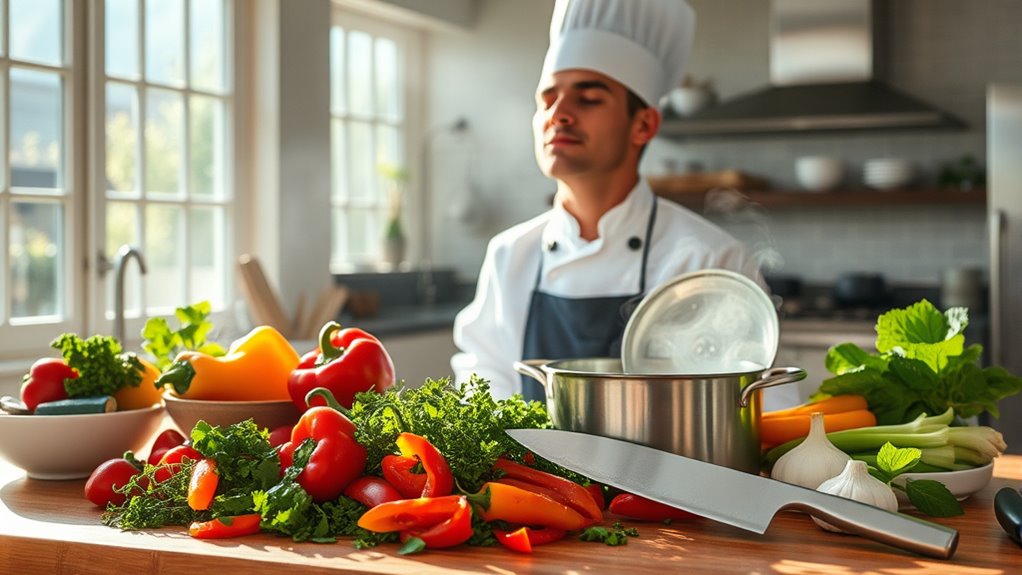Mindfulness in the kitchen is key for chefs. It sharpens your focus, reduces stress, and helps you connect deeply with the cooking process. By embracing mindful techniques, you can enhance your creativity and efficiency while cooking. Simple actions like decluttering your workspace and engaging all your senses make a big difference. You’ll find that this approach not only improves your culinary skills but also brings joy and satisfaction to your cooking experience. Discover more ways to cultivate mindfulness.
Key Takeaways
- Engage all senses during food preparation to cultivate awareness and enhance the cooking experience.
- Establish a calm kitchen environment by decluttering and using soft lighting to reduce distractions.
- Practice mindful breathing techniques to stay centered and focused while cooking.
- Incorporate rituals, such as lighting a candle, to create a serene atmosphere before starting.
- Reflect on flavors and textures during tasting, promoting appreciation and skill development in culinary practices.
Benefits of Mindfulness in the Kitchen
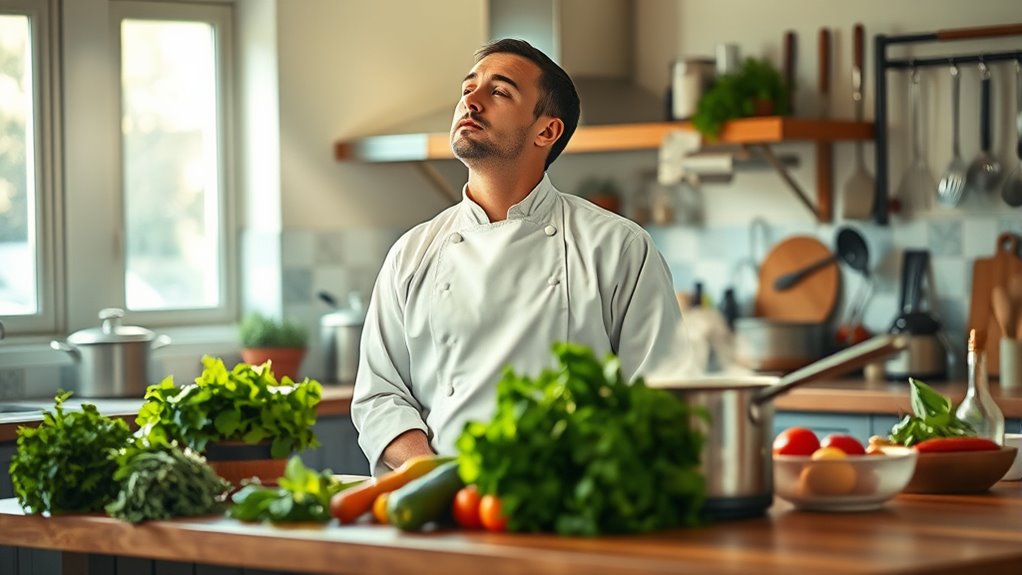
When you practice mindfulness in the kitchen, you can experience a range of benefits that enhance both your cooking and overall well-being.
Mindful cooking reduces stress by allowing you to focus on the task at hand, helping to manage anxiety and difficult emotions. It offers a mental pause from daily pressures, while also providing a sense of control and mastery over your culinary skills.
Mindful cooking helps alleviate stress, enhances focus, and empowers you with a sense of control in the kitchen.
As you immerse yourself in the process, you’ll improve your focus and cultivate a calm environment, leading to greater clarity.
Additionally, mindful cooking serves as accessible self-care, reminding you of your worth and filling you with personal satisfaction. This practice not only nourishes your body but also fosters a deeper connection with yourself.
Creating a Mindful Kitchen Environment
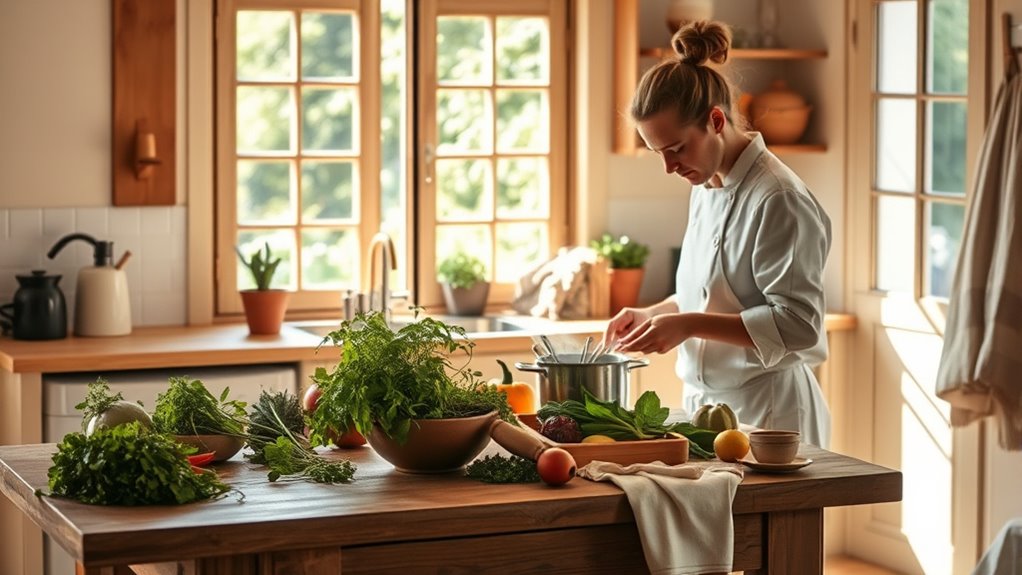
Creating a mindful kitchen environment starts with intentional design choices that foster tranquility and focus.
Begin by decluttering your counters and organizing utensils and ingredients for efficiency. Introduce indoor plants to purify the air and enhance the ambiance. Good lighting, especially natural light, creates a comfortable cooking space, while serene colors like cream or blue evoke calmness.
Set the mood with soft, soothing music and maintain a comfortable temperature. Establish simple rituals, such as lighting a candle or silencing digital devices, to minimize distractions.
Mindful Cooking Techniques
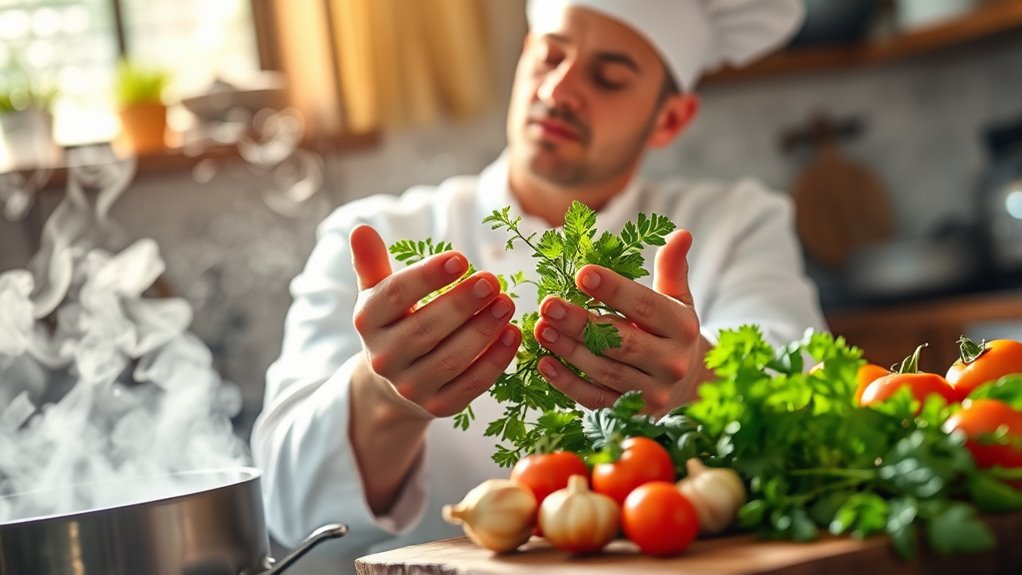
Mindful cooking techniques enhance your culinary experience by engaging your senses and fostering a deeper connection to the food you prepare. Focus on the sights, sounds, smells, and textures throughout your cooking process.
Approach each task with intention, performing actions purposefully and without judgment. As you cook, practice mindful tasting to truly appreciate flavors and improve your skills. Incorporate deep breathing exercises to stay centered, even during challenging moments.
Recognize distractions when they arise, gently redirecting your focus back to the task at hand. Embrace curiosity and patience, allowing the cooking experience to unfold naturally.
Mindful Chopping and Preparation
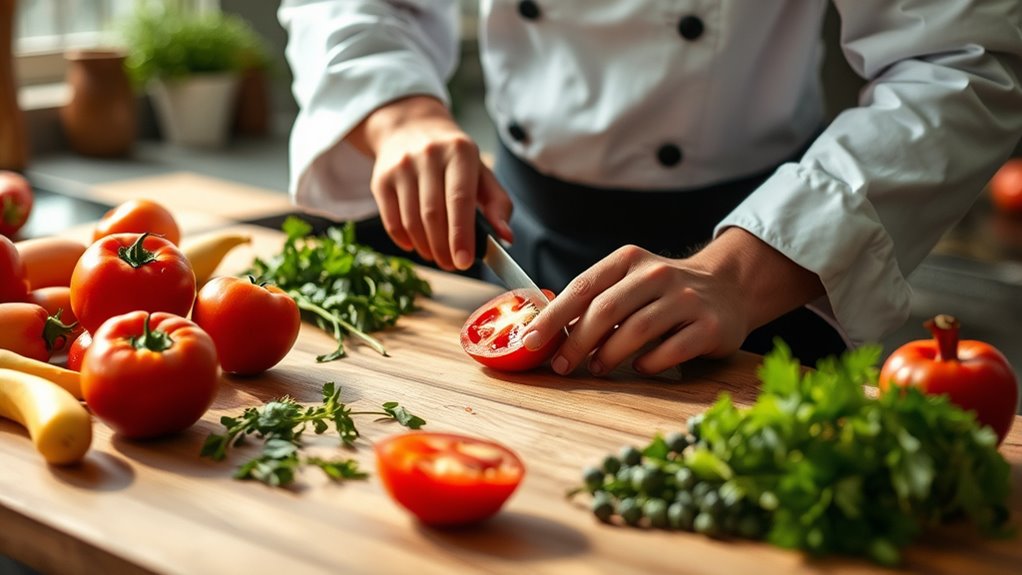
Chopping and preparing ingredients with intention can transform your cooking experience and deepen your connection to the food you create.
Start by using a secure knife grip, wrapping your fingers around the handle and resting your thumb on the blade. Adopt the claw grip to protect your fingers, guiding the knife with your knuckles. Employ a rocking motion for smooth, precise cuts, maintaining a consistent pace for efficiency.
Be aware of your ingredients—consider their taste, smell, and origin. Create a stable kitchen environment, free from distractions, and engage your senses by noticing the sights and sounds around you.
As you chop, stay present in each step, allowing your practice to deepen your mindfulness and enhance your culinary skills.
Mindful Tasting and Eating
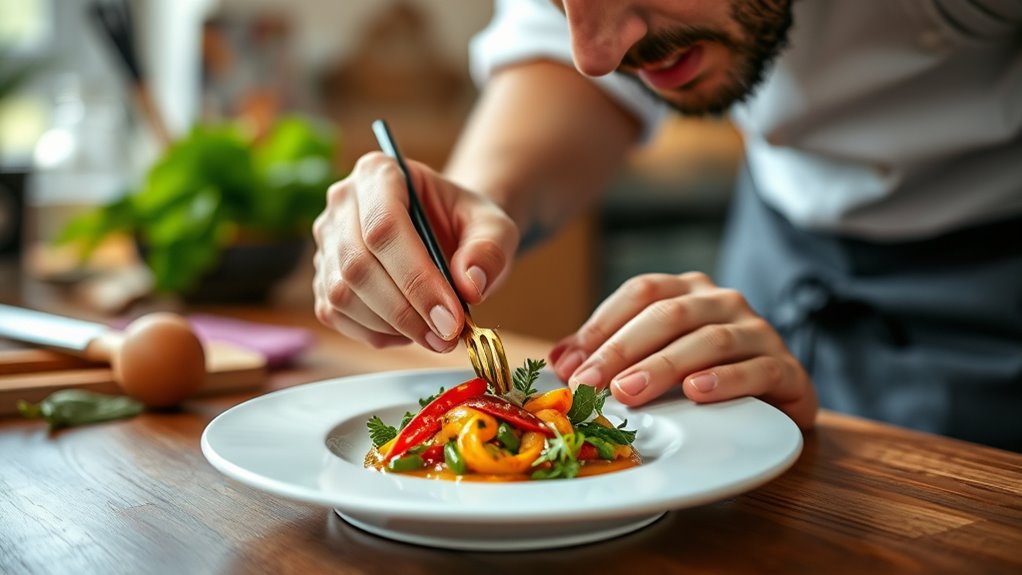
While savoring your food, you can elevate your dining experience by engaging all your senses.
Begin by creating silence around you, which sharpens your focus. Observe the colors and presentation, allowing the visual appeal to enhance your anticipation.
Take a moment to appreciate the aroma before your first bite; this heightens your sensory awareness. As you chew, do so slowly, fully experiencing the flavors and textures without rushing.
Appreciate the aroma before your first bite; savor each flavor and texture by chewing slowly and mindfully.
Avoid judgments about your food; instead, approach each bite with curiosity. Regularly check in with your body, assessing your hunger and satisfaction.
Practicing gratitude for your meal fosters appreciation and reduces stress, transforming eating into a mindful ritual that nourishes both body and soul.
Integrating Mindfulness Into Daily Cooking Routines
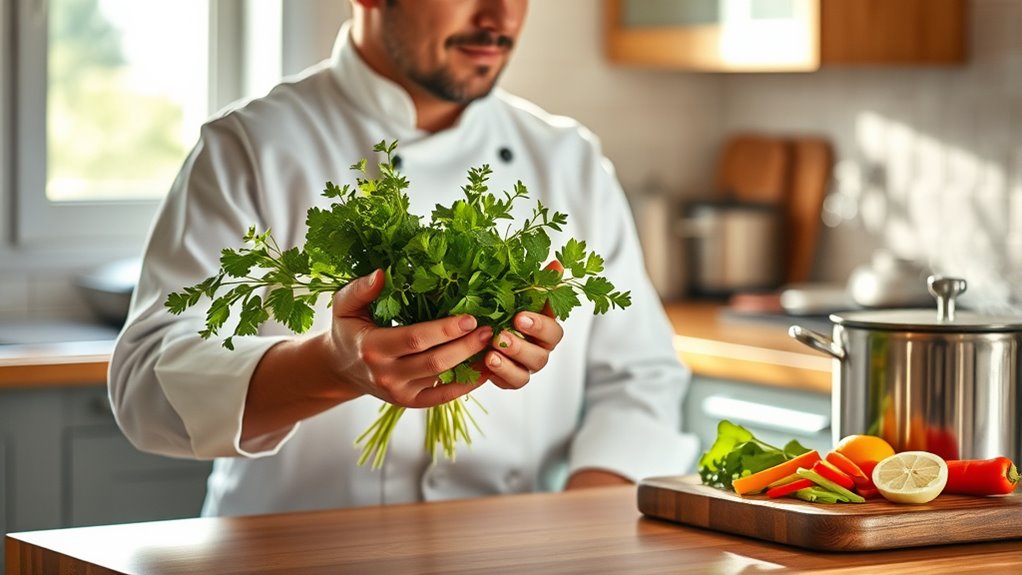
Cooking can become a meditative practice when you intentionally integrate mindfulness into your daily routines.
Start by decluttering your kitchen; a clear countertop fosters calmness. Use soft lighting and light a non-scented candle to create a serene atmosphere. Open windows for fresh air, and wear an apron to get into the ‘chef mindset’.
During cooking, focus on mindful breathing and engage your senses—notice the colors, textures, and smells of your ingredients. Embrace single-tasking; give each step of your recipe your full attention.
Handle ingredients with care while expressing gratitude for their origins. By establishing these rituals and turning off digital distractions, you’ll transform your cooking experience into a mindful journey. Additionally, ensuring proper airflow in your cooking space can enhance your overall mindfulness by promoting a more pleasant and fresh environment.
The Role of Mindfulness in Stress Reduction
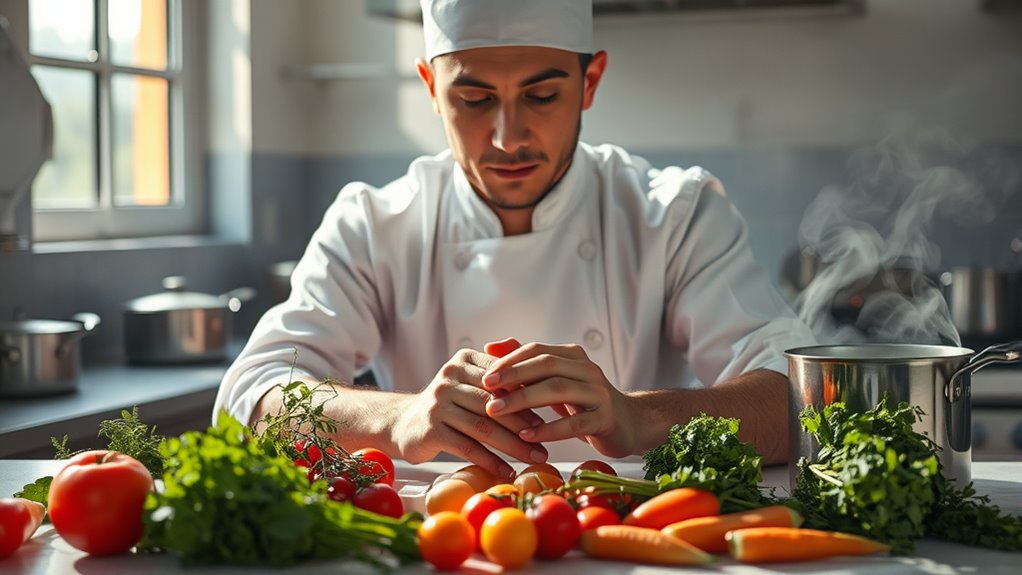
Mindfulness plays a vital role in stress reduction, especially for chefs navigating the high-pressure culinary environment.
By practicing mindfulness, you’ll enhance emotional regulation and self-awareness, which are crucial for managing workplace stress. This approach helps you respond constructively to challenges rather than reacting impulsively.
Mindfulness also alleviates physical symptoms of stress, like fatigue and headaches, by lowering cortisol levels. Furthermore, it fosters a supportive workplace culture, building resilience and trust among your team.
Mindfulness reduces stress-related fatigue and headaches while cultivating resilience and trust within your culinary team.
Regular mindfulness practice can even prevent burnout, a common issue in the culinary field. Techniques such as meditation and deep breathing can significantly reduce perceived stress levels, improving both your well-being and performance in the kitchen.
Embrace mindfulness for a calmer culinary journey.
Enhancing Creativity Through Mindfulness
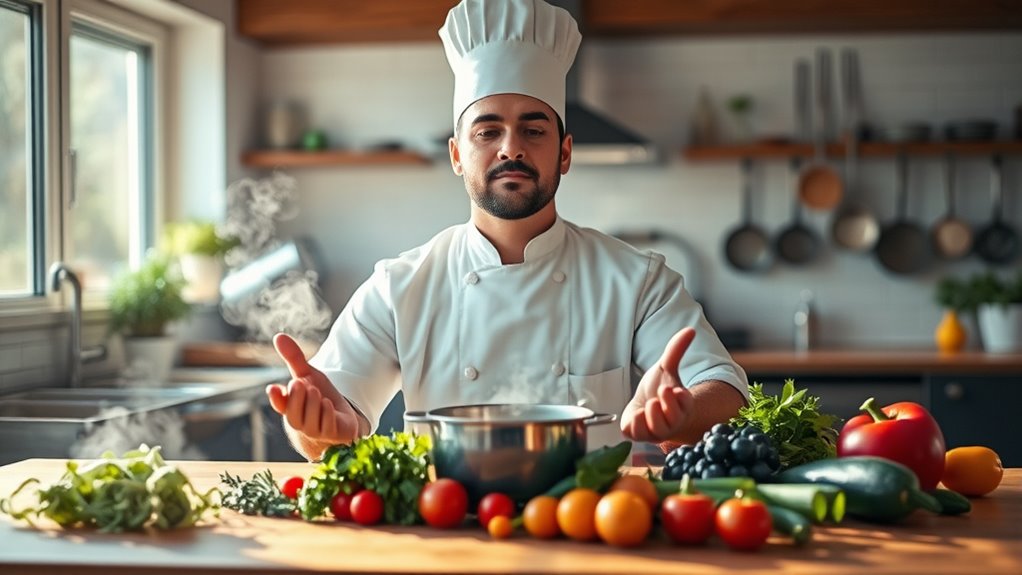
How can you unlock your creative potential in the kitchen? Embracing mindfulness can be your key. By practicing mindfulness, you’ll improve concentration and open-minded thinking, essential skills for any chef.
Let go of self-consciousness and fear of judgment, allowing your creativity to flow freely. Engage your senses while cooking; this meditative quality can spark innovative ideas and culinary experimentation.
Allow yourself some deliberate mind-wandering during these moments—it’s a powerful way to enhance creative thinking.
Cultivating Focus and Efficiency With Mindfulness
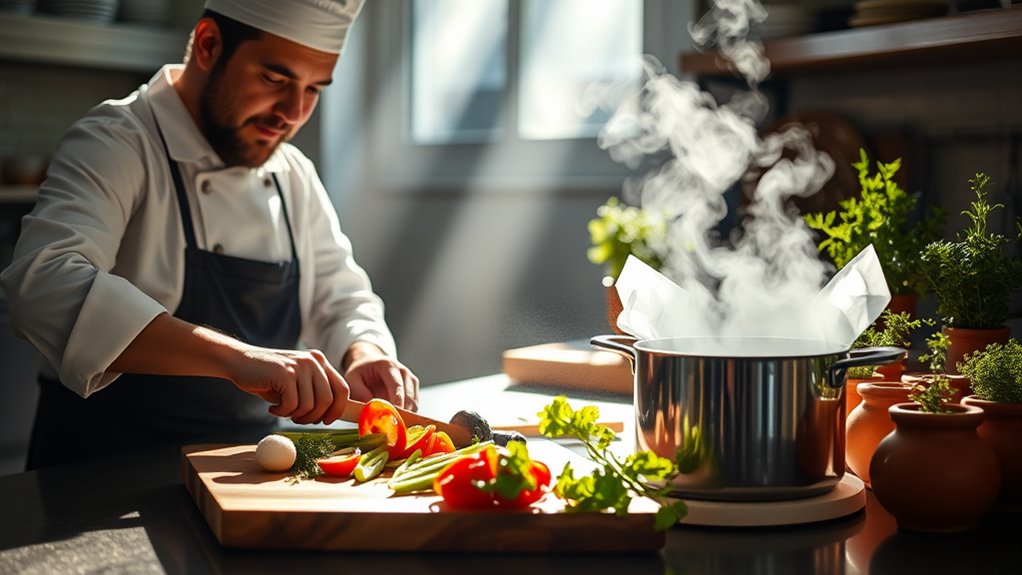
Unlocking creativity in the kitchen sets a strong foundation for honing your focus and efficiency. By removing smartphones and other distractions, you can immerse yourself fully in the cooking process.
Cooking without music or podcasts sharpens your sensory awareness, allowing you to savor the crunch of vegetables and the simmer of sauces. Mindful practices minimize mental clutter, helping you stay on task and reduce errors.
Embrace each step of a recipe with deliberate movements to optimize your time and resources. Engaging fully in your cooking not only enhances your skills but also creates a calming environment, making meal preparation a therapeutic experience. Incorporating mindfulness techniques can also significantly enhance your overall well-being.
Over time, these mindfulness techniques will transform your relationship with food and cooking.
Frequently Asked Questions
How Can Mindfulness Improve Teamwork in the Kitchen?
Mindfulness can significantly enhance teamwork in the kitchen. When you practice mindfulness, you become more aware of your team dynamics, leading to clearer communication and fewer misunderstandings.
By staying present, you can focus better on tasks, reducing errors and improving efficiency. Additionally, mindfulness fosters empathy among team members, creating a supportive environment.
This awareness helps you coordinate tasks effectively, understand your role, and resolve conflicts calmly, ultimately enhancing collaboration and productivity.
What Are the Long-Term Benefits of Practicing Mindfulness for Chefs?
Imagine you’re in a bustling kitchen, juggling multiple orders. Practicing mindfulness long-term can enhance your focus, reduce stress, and boost creativity.
You might recall a time when you seamlessly adapted a recipe under pressure, thanks to your heightened awareness. This ongoing practice helps you develop emotional intelligence and resilience, improving your leadership skills and team dynamics.
Ultimately, you’ll foster a positive workplace culture that elevates job satisfaction and performance for everyone involved.
Can Mindfulness Help Prevent Burnout in Culinary Professionals?
Absolutely, mindfulness can help prevent burnout in culinary professionals.
By practicing mindfulness, you become more aware of your thoughts and feelings, allowing you to manage stress effectively. It helps you stay focused and present, reducing overwhelm during hectic shifts.
Incorporating techniques like deep breathing and sensory awareness can enhance your emotional balance and well-being.
Ultimately, prioritizing mindfulness can lead to greater job satisfaction and a healthier, more sustainable work-life balance.
Are There Specific Mindfulness Apps for Chefs?
While you might juggle multiple tasks in a chaotic kitchen, mindfulness apps can help you find calm amidst the storm.
Apps like Headspace and Insight Timer offer tailored meditations to reduce stress, while MindBell nudges you to pause and breathe.
You’ll also find Plum Village’s guided practices beneficial, transforming your cooking into a mindful experience.
With these tools, you can enhance focus and creativity, turning pressure into inspiration.
How Do I Measure My Progress in Mindfulness While Cooking?
To measure your progress in mindfulness while cooking, pay attention to your self-awareness during tasks.
Notice any emotional shifts, like reduced anxiety or increased calmness.
Observe if you’re exploring new recipes or cooking methods more easily.
Take note of how time feels—does it pass smoothly, or do you feel rushed?
Lastly, consider feedback from others regarding your meals’ quality and presentation; it can provide insight into your mindful cooking journey.
Conclusion
Embracing mindfulness in your kitchen can transform not just your cooking, but your overall culinary experience. By focusing on each task, you reduce stress and enhance creativity, making every meal an opportunity for growth. So, why not infuse your cooking routine with mindfulness? You’ll find that the simple act of preparing food becomes a joyful and fulfilling practice, allowing you to connect deeply with your ingredients and the process. Start today, and savor every moment in the kitchen!

